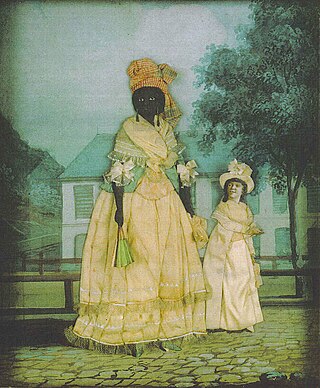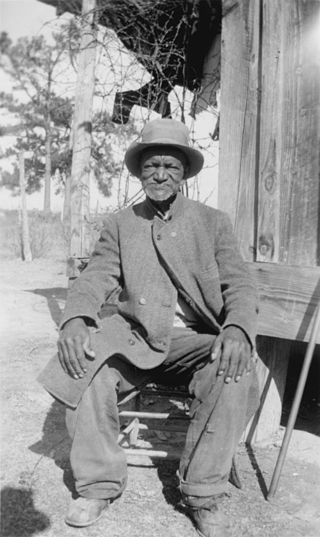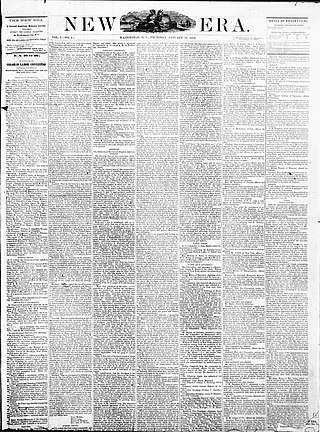Related Research Articles

The Thirteenth Amendment to the United States Constitution abolished slavery and involuntary servitude, except as punishment for a crime. The amendment was passed by the Senate on April 8, 1864, by the House of Representatives on January 31, 1865, and ratified by the required 27 of the then 36 states on December 6, 1865, and proclaimed on December 18. It was the first of the three Reconstruction Amendments adopted following the American Civil War.

Dred Scott was an enslaved African American man who, along with his wife, Harriet, unsuccessfully sued for freedom for themselves and their two daughters in the Dred Scott v. Sandford case of 1857, popularly known as the "Dred Scott decision". The case centered on Dred and Harriet Scott and their children, Eliza and Lizzie. The Scotts claimed that they should be granted their freedom because Dred had lived in Illinois and the Wisconsin Territory for four years, where slavery was illegal, and laws in those jurisdictions said that slaveholders gave up their rights to slaves if they stayed for an extended period.

In the British colonies in North America and in the United States before the abolition of slavery in 1865, free Negro or free Black described the legal status of African Americans who were not enslaved. The term was applied both to formerly enslaved people (freedmen) and to those who had been born free.
Black Reconstruction in America: An Essay Toward a History of the Part Which Black Folk Played in the Attempt to Reconstruct Democracy in America, 1860–1880 is a history of the Reconstruction era by W. E. B. Du Bois, first published in 1935. The book challenged the standard academic view of Reconstruction at the time, the Dunning School, which contended that the period was a failure and downplayed the contributions of African Americans. Du Bois instead emphasized the agency of Black people and freed slaves during the Civil War and Reconstruction and framing the period as one that held promise for a worker-ruled democracy to replace a slavery-based plantation economy.

This is a selected bibliography of the main scholarly books and articles of Reconstruction, the period after the American Civil War, 1863–1877.
Brian Kelly is an American historian and a lecturer in US history, teaching at Queen's University Belfast in Northern Ireland. His work is concerned mainly with labor and race in the American South, although much of his most recent scholarship focuses on the formative struggles around slave emancipation during the American Civil War and the Reconstruction Era that followed.
The civil rights movement (1865–1896) aimed to eliminate racial discrimination against African Americans, improve their educational and employment opportunities, and establish their electoral power, just after the abolition of slavery in the United States. The period from 1865 to 1895 saw a tremendous change in the fortunes of the black community following the elimination of slavery in the South.

Slave Narratives: A Folk History of Slavery in the United States is a collection of histories by formerly enslaved people undertaken by the Federal Writers' Project of the Works Progress Administration from 1936 to 1938. It was the simultaneous effort of state-level branches of FWP in seventeen states, working largely separately from each other. FWP administrators sought to develop a new appreciation for the elements of American life from different backgrounds, including that from the last generation of formerly enslaved individuals. The collections of life histories and materials on African American life that resulted gave impetus to the collection.

African Americans are the second largest ethnic group in the state of Tennessee after whites, making up 17% of the state's population in 2010. African Americans arrived in the region prior to statehood. They lived both as slaves and as free citizens with restricted rights up to the Civil War.

Word by Word: Emancipation and the Act of Writing is a 2013 historical book and analysis of a collection of writings by American slaves and befreed slaves. It was written by Christopher Hager and published by Harvard University Press.
Manisha Sinha is an Indian-born American historian, and the Draper Chair in American History at the University of Connecticut. She is the author of The Slave's Cause: A History of Abolition (2016), which won the Frederick Douglass Book Prize.

Self-Taught: African American Education in Slavery and Freedom is a book that tells the history of African American self-education from slavery through the Reconstruction Era. It was written by history professor Heather Andrea Williams and published in 2007 by the University of North Carolina Press.

The Education of Blacks in the South, 1860–1935 is a history of African-American education in the American South from the Reconstruction era to the Great Depression. It was written by James D. Anderson and published by the University of North Carolina Press in 1988. The book won awards including the American Educational Research Association 1990 Outstanding Book Award.

Erica Armstrong Dunbar is an American historian at Rutgers University. She is a distinguished Charles and Mary Beard Professor of History at Rutgers. An historian of African American women and the antebellum United States, Dunbar is the author of A Fragile Freedom: African American Women and Emancipation in the Antebellum City (2008) and Never Caught: The Washingtons’ Relentless Pursuit of Their Runaway Slave, Ona Judge (2017). Never Caught was a National Book Award for Nonfiction finalist and winner of the Frederick Douglass Prize.

New National Era(1870–1874) was an African American newspaper, published in Washington D.C. during the Reconstruction Era in the decade after the American Civil War and the Emancipation Proclamation. Originally known as the New Era, the pioneering abolitionist and writer Frederick Douglass renamed it in 1870 when he became the newspaper's publisher and editor.
Maxine Deloris Jones is an American historian. She is a professor of history at Florida State University. Jones co-authored a book on African American history in Florida and another on Talladega College. She was the principal author of a report on the Rosewood Massacre for the Florida Legislature.

The history of slavery in Oklahoma began in the 1830s with the five Native American nations in the area: Cherokee, Chickasaw, Choctaw, Creek, and Seminole. Slavery within these Native American nations began simply by placing a lower status on them than their master. The slavery in these tribes varied in style, being specifically different from American slavery. Slavery in the area continued to grow for many years, even throughout the entirety of the Civil War. The growth was significant, slaves making up a portion of the population in the new Indian territory. Slavery ended in the Oklahoma area with the completion of the Civil War. Treaties were made with the nations regarding citizenship and slavery for African Americans. The repercussions of slavery that followed greatly affected the state, with prominent racial issues.
Reconstruction in the state of South Carolina was unique compared to other southern states due to heavy political involvement of both] and newly freed African American slaves.
Dale Baum is an American historian and long time professor at Texas A&M University. He researches the political history of the American Civil War and Reconstruction era, Texas history, and quantitative research of historiography. Baum has authored three books, The Civil War Party System (1984), The Shattering of Texas Unionism (1998), and Counterfeit Justice (2009).

James Mars was an American slave narrative author and political activist. Born into slavery in Canaan, Connecticut, he gained his freedom in 1811. In 1864, he published his memoir A Life of James Mars, a Slave Born and Sold in Connecticut, Written by Himself—a notable example of the slave narrative genre. His grave is a stop on the Connecticut Freedom Trail. In 2021, Governor Ned Lamont declared May 1 to be James Mars Day in Connecticut.
References
- 1 2 3 "Staff profile". St. Lawrence University. Retrieved 2020-11-21.
- 1 2 Regosin, Elizabeth Ann (1995). Slave Custom and White Law: Ex-Slave Families and the Civil War Pension System, 1865-1900 (Ph.D. thesis). University of California, Irvine. OCLC 35547982.
- ↑ "No Matter the Modality, Humanity is in the Pedagogy". St. Lawrence University. August 15, 2020. Retrieved 2020-11-21.
- ↑ Reviews of Freedom's Promise:
- Cottrol, Robert J. (2003). "Review". The Journal of Economic History. 63 (3): 902–903. doi:10.1017/S0022050703542292. ISSN 0022-0507. JSTOR 3132338.
- Reece, Lewie (2003). "Review". Tennessee Historical Quarterly. 62 (3): 287–288. ISSN 0040-3261. JSTOR 42627780.
- Lindquist Dorr, Lisa (2002). "Review of Freedom's Promise: Ex-Slave Families and Citizenship in the Age of Emancipation". The Virginia Magazine of History and Biography. 110 (3): 416–417. ISSN 0042-6636. JSTOR 4250045.
- Cody, Cheryll Ann (2003). "Review". The Journal of American History. 90 (3): 1034–1035. doi:10.2307/3660948. ISSN 0021-8723. JSTOR 3660948.
- Mintz, Steven (2004). "Review of Freedom's Promise: Ex-Slave Families and Citizenship in the Age of Emancipation". The Journal of Southern History. 70 (1): 178–179. doi:10.2307/27648367. ISSN 0022-4642. JSTOR 27648367.
- Rogers, William Warren (2003). "Review". The Georgia Historical Quarterly. 87 (1): 132–135. ISSN 0016-8297. JSTOR 40584629.
- ↑ Reviews of Voices of Emancipation: